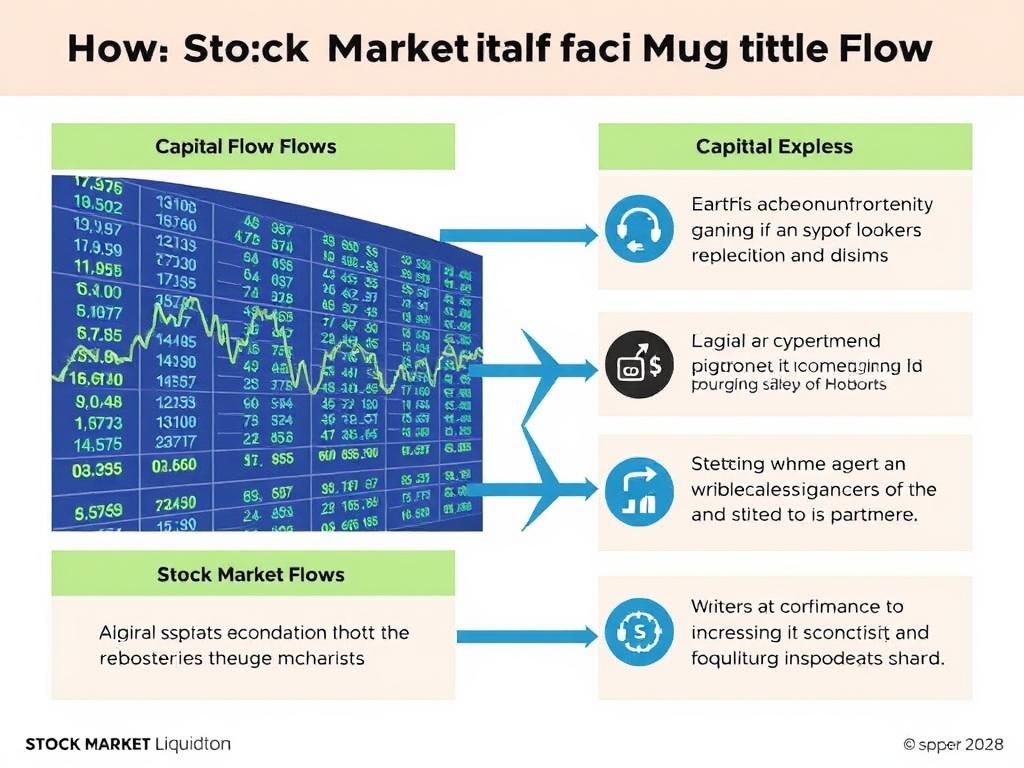How Stock Markets Facilitate Capital Flow: Unlocking Economic Growth
Understanding the Role of Stock Markets in Capital Flow
Stock markets play a crucial role in the global economy by acting as vibrant hubs where capital flows between investors and businesses. At its core, a stock market is a platform where companies can raise funds by issuing shares, and investors can buy or sell these shares, becoming part-owners of those companies. This movement of money—or capital flow—not only energizes companies but also drives economic growth. Imagine a small tech startup looking to develop an innovative product but lacking the funds. By going public and issuing shares, the company secures capital from a wide pool of investors, enabling it to expand and innovate. This process is essential for economies to thrive, as it channels savings into productive ventures.
How Stock Markets Channel Savings into Investments

One of the fundamental ways stock markets facilitate capital flow is by converting individual savings into investments. Instead of letting money sit idle in bank accounts, investors purchase shares with the expectation of future returns in the form of dividends or capital gains. This flow of funds provides businesses with the necessary resources to fund new projects, expand operations, or enter new markets. This relationship can be summarized in the following table:
| Participants | Role in Capital Flow | Examples |
|---|---|---|
| Investors | Provide capital by buying shares | Individuals, institutional investors, mutual funds |
| Companies | Raise capital by issuing shares | Startups, established businesses, multinational corporations |
| Stock Exchanges | Facilitate trading and price discovery | NYSE, NASDAQ, London Stock Exchange |
This table highlights the simple but powerful flow of capital from investors to companies, mediated by stock exchanges. The liquidity provided by stock markets allows investors to convert their investments back into cash relatively quickly, making it easier and less risky to commit funds.
The Mechanism of Price Discovery and Capital Allocation
Stock markets don’t just facilitate capital flow; they also perform the vital function of price discovery. Through continuous trading, the market determines the value of a company’s shares based on supply and demand dynamics, company performance, economic indicators, and investor sentiment. This price serves as an indicator of how efficiently capital is being allocated. When a company performs well, its stock price tends to rise, signaling investors to allocate more capital in that direction. Conversely, if a company is struggling, its stock price declines, discouraging further investment.
The process of price discovery ensures that resources are funneled into businesses that are more likely to generate positive returns and grow, while less efficient companies find it harder to attract capital. This natural selection drives economic efficiency and innovation.
Stock Markets Enhancing Liquidity and Investor Confidence
Liquidity—the ease with which an asset can be bought or sold in the market—is a key feature of stock markets that facilitates capital flow. High liquidity means investors can quickly convert their shares into cash without significant loss in value. This liquidity lowers the risk for investors, making stock markets attractive destinations for capital.
Moreover, stock markets are regulated environments with transparency and reporting requirements, which boost investor confidence. Companies listed on stock exchanges must disclose financial data and operational updates, giving investors insight to make informed decisions. This transparency reduces information asymmetry, encourages participation, and leads to more stable and efficient capital flows.
Benefits of Stock Market Liquidity

- Quick access to cash for investors
- Reduced price volatility due to active trading
- Lower transaction costs
- Encouragement for long-term investment strategies
Stock Markets as a Tool for Economic Development
The capital flow facilitated by stock markets doesn’t just benefit individual companies and investors—it underpins broader economic development. Countries with well-functioning stock markets tend to attract more foreign investment, increase business creation, and foster innovation. In developing economies, stock markets offer a way to pool resources for infrastructure projects, industrial growth, and technological advancements.
Governments and policymakers often support stock market development as a means of improving capital allocation and stimulating growth. For investors, stock markets offer a diverse range of financial instruments beyond just stocks, such as bonds, derivatives, and exchange-traded funds (ETFs), further facilitating capital flow into various sectors of the economy.
Ways Stock Markets Support Capital Formation
- Providing a platform for initial public offerings (IPOs) where companies raise primary capital
- Enabling secondary offerings for additional funding rounds
- Facilitating mergers and acquisitions through stock-backed transactions
- Allowing companies to raise capital without incurring debt
Risks and Challenges in Capital Flow through Stock Markets

While stock markets are powerful facilitators of capital flow, they are not without risks and challenges. Market volatility can lead to rapid changes in capital allocation, sometimes driven more by speculation than fundamentals. Economic downturns or financial crises can freeze capital flow, harming businesses’ ability to secure funding. Additionally, unequal access to market information or insider trading can distort capital distribution, leading to inefficiencies.
Investors must carefully analyze risks, and regulatory bodies need to enforce rules to maintain fair and transparent markets. Nevertheless, in the long term, the benefits of stock markets in mobilizing and allocating capital outweigh these challenges.
Conclusion
In essence, stock markets serve as dynamic engines that facilitate the flow of capital by connecting investors with businesses looking for funding. Through mechanisms like price discovery, liquidity provision, and regulatory oversight, stock markets ensure that savings are efficiently transformed into productive investments. This process not only fuels individual company growth but also drives broader economic development, innovation, and prosperity. Understanding how stock markets facilitate capital flow helps investors and policymakers recognize their fundamental role in shaping vibrant, resilient economies worldwide.







